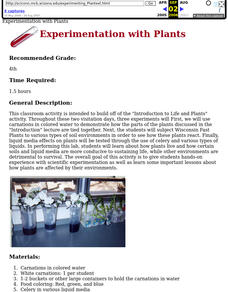Curated OER
First Nations Plants and their Uses
Students identify the uses of plants by researching Native Americans. In this First Nations culture lesson, students identify the First Nations coastal people of British Columbia and their use of plants such as seaweed, bark and moss....
Curated OER
Dry-Land Kalo-Growing New Plants from Stems
Students explore Hawaiian plants. In this Hawaii culture and botany instructional activity, students plant the haha(stem) of a taro plant. Students listen to Hawaiian myths about the taro plant and chorally speak a Hawaiian chant of...
Curated OER
Experimentation With Plants
Fourth graders experiment with different varieties of plants and draw conclusions after performing a series of lab activities. A very helpful student worksheet is given. This is a nicely done introductory lesson plan for life science.
Curated OER
Plants And Pollination
Students describe sexual reproduction in plants, including the process of pollination, how insects assist in pollination, and how pollination differs from fertilization. They also explore the importance of honey bees to Arizona agriculture.
Curated OER
Life Cycle of Brassica Plants: Planting Seeds
Students explore botany by participating in a calendar class activity. In this plant observation lesson plan, students examine a diagram of a Brassica plant and identify its anatomy before planting their own seeds and viewing the changes...
Curated OER
Examining Seeds
Learners explore botany by conducting an investigation in class. In this seeds instructional activity, students utilize lima bean seeds and magnifying glasses to examine the different parts of a seed after it has been dissected. Learners...
Curated OER
Seed Germination
Young scholars explore plants and the scientific method. In this plant growth lesson plan, students follow the steps in the scientific method to perform a seed germination experiment as a whole class. Young scholars work in a group to...
Curated OER
A Seed Dispersal Investigation
Students investigate the function and purpose of seed dispersal. In this garden lesson, students examine the importance of wind in the plant cycle. Students construct a flying seed model from an attached design and discuss if it can be...
Curated OER
Growth of Seeds and Humans
For this growth of seeds and humans worksheet, 1st graders write things that seeds need and that humans need, then draw a picture of seeds growing.
Curated OER
Structure and Function of Seeds
Students study the functions of seeds. In this biology lesson plan, students observe the structure of a seed as they show the function of the cotyledons in providing nourishment to the plant during the early times after germination.
Curated OER
Plants, Ecology, Seed Planting
First graders use senses to examine objective or events, then gather and interpret data with instruments. They design invention to support or refute hypothesis, then generate, record, and organize data. They improve environmental...
Curated OER
Garden In a Glove
Students investigate the concept of seeds and how they can germinate. They obtain seeds and isolate them in a rubber glove before transplanting them into the ground. The lesson includes a graphic organizer for observations or information.
Curated OER
The Alphabet Garden
Third graders transplant, tend and observe a plant for each letter of the alphabet in a school garden. They work individually to research and select a plant that will grow in their local climate. Students then care for and observe the...
Curated OER
How to Grow a Sunflower Plant
Students explore botany by conducting a sunflower growth experiment. In this plant life activity, students identify the anatomy of a sunflower plant and the essential nutrients it requires to grow. Students utilize compost, soil, garden...
K5 Learning
The Life Cycle
Studying plant, animal, or insect life cycles? Pair a science unit with a reading comprehension worksheet on life cycles. The passage touches briefly on butterfly, plant, frog, and dog life cycles before prompting readers to answer six...
Michigan Farm Bureau
The Little Red Hen
No one will be saying "Not I" with a lesson that combines The Little Red Hen with the life cycle of a wheat stem! After reading the story in your class, pass out wheat stems to your learners and have them examine the plants closely,...
K12 Reader
What’s Eating You?
Introduce your class to producers, consumers, and pollinators with a reading passage. Class members read the text and respond to five related questions.
K5 Learning
The Story of a Wise Woman
The Story of a Wise Woman tells the tale of South Carolina's, Eliza Lucas Pinckney and how she persevered to plant and harvest indigo. With this short story and questions worksheet, your early readers test their comprehension with four...
Rain Bird Corporation
Rain Forest Teaching Curriculum
Take young naturalists on an exploration of the world's tropical rainforests with this extensive collection of lessons and activities. Whether its creating leaf and flower prints or investigating the absorption spectrum of chlorophyl,...
Agriculture in the Classroom
Pumpkins... Not Just For Halloween
Celebrate fall with four pumpkin themed hands-on activities! After learning about pumpkins, scholars complete two activity sheets that reinforce estimation and word problems. They then plant pumpkin seeds and bake a pie in a bag.
Curated OER
The Dirt on Plants
Students draw and label the four parts of a plant. They describe changes that are part of the common life cycle. Students follow various one and two step directions. They are asked to discuss that they can recall about plants.
Curated OER
Inside A seed
Students examine the inside of a seed to see the beginnings of a plant. They identify the elements that plants need to grow and survive. They grow their seeds in the classroom.
Curated OER
Seed Plants: Gymnosperms
Students identify what makes up a seed. In this gymnosperms lesson students identify conifers and explain how they reproduce and what the importance of gymnosperms are.
Curated OER
How Does a Seed Grow Into a Plant?
Second graders explore how seeds grow into plants. They discuss types of seeds and place seeds in wet paper towels to germinate. They draw a picture in their journal to record their observations for four days. They take pictures of their...

























